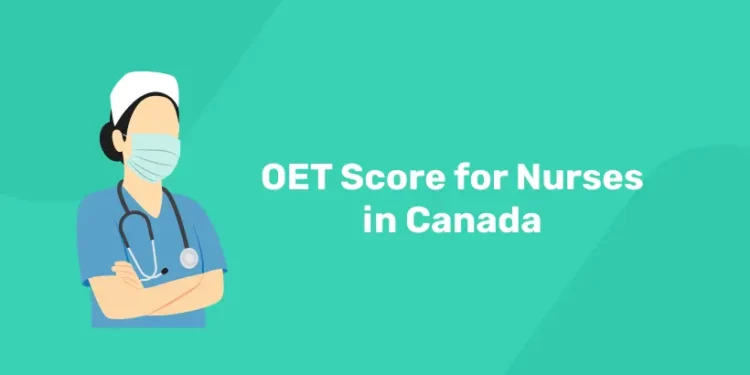Table of Contents
Nurses are in high demand, especially internationally. The OET requirements for nurses who want to work in the medical area should be known to those who are considering immigration to Canada. The exam known as the Occupational English Test, or OET for short, was designed with healthcare workers in mind.
The OET assesses candidates English language competency. The OET test’s scenarios are drawn from actual situations that you might come into in the future. In Canada, being a registered nurse requires completing the OET qualification. To be employed in Canada’s healthcare sector, nurses need to meet specific requirements.
Get your Desired OET Scores in Weeks! Get Free Demo Class Here!
Introduction
In Canada, OET was accepted in 2021. After passing the English language test designed for doctors, you are eligible to work in Canada. Employers are able to recognize healthcare personnel who speak English well. They are necessary for the OET test to be used in a safe and effective manner. Real-world job duties and pertinent language tasks are also included in the OET exam. Doctors who practice in English-speaking environments generally want them.
The level of ability required to operate in a variety of settings, such as technical documentation or customer service, is indicated by a person’s OET score in Canada. If you want to become a nurse and immigrate to Canada, you must speak the language fluently and achieve the highest possible scores in order to be chosen for positions in reputable hospitals. One of the most well-liked nations that accepts OET is Canada.
For the healthcare specialists to be eligible and permitted to work in the Canadian healthcare sector, they must receive at least 350 marks, or a grade B, on each subtest. Like all other foreign countries, Canada also accepts OET scores for a period of two years. It is important for candidates to stay current with both language proficiency and emerging ideas in the healthcare sector.
Why is OET Required for Nurses in the Canada?
First off all, the OET exam will help organizations find healthcare professionals who have the English language proficiency required for safe and effective practice. Additionally, nurses seeking licensure in Oregon need to obtain a minimum of four Grade Bs, or a score of 350. A minimum score of 300 is required for nurses applying for licensure in Florida, and they must get at least four Grade C+.
Additionally, the International Medical Education and Research, or ECFMG Certification, evaluates the preparedness of foreign medical graduates (IMGs) to enroll in residency or fellowship programs authorized by the Accreditation Council for Graduate Medical Education in the United States. Additionally, their capacity to apply to a licensing body for a medical license. There are currently 12 countries that accept OET in total, thanks to the United States’ adoption of the program.
1. Effective Patient Interaction
In order to give the patients accurate information about their care, including prescription details, treatment plans, and the health advice, nurses must communicate with the them in a clear and effective manner. It is essential to ensure good patient communication and respecting that the OET assesses nurses capacity to communicate complicated medical information to the patients in an understandable manner.
2. Meeting the Professional Requirements
To guarantee that all the practicing nurses in Canada uphold the high levels of professionalism predict in healthcare settings. Also the nursing regulatory agencies and licensing authorities need proof of English language fluency. Because the OET is specifically designed for the healthcare industry and evaluates the nursing specific language abilities, it is an important part for fulfilling these professional standards.
3. The Effective Team Collaboration
Nurses collaborate closely with the doctors, specialists, and the other medical staff members. Collaboration and clear communication are very important for the effective teamwork. The OET evaluates a nurse’s capacity to take part in the team conversations and then communicate information correctly, and make a valuable contribution to the patient care.
4. Accurate Clinical Documentation
Monitoring the patient progress, organizing care, and adhering to the legal and regulatory standards all depends on accurate recordkeeping. The Nurses need to be proficient in correctly and clearly recording the medical observations, treatment plans, and the patient information. The OET makes sure that the nurses possess the writing abilities needed to keep the accurate and thorough records.
5. Adherence to Legal and Ethical Standards
In the healthcare industry, adhering to legal and ethical standards frequently require understanding and executing the important guidelines and practices. To follow with all the legal and professional requirements and cross these restrictions, the nurses must possess solid English language abilities. The OET assists in making sure that the nurses are able to follow these guidelines.
6. Providing Patient Education and Support
Nurses give the patients information about their medical issues, available treatments, and ways to take care of themselves. Ensuring that people comprise and effectively manage their health requires clear and the efficient communication. The OET evaluates a nurse’s capacity to deliver this instruction in an understandable and an encouraging manner.
7. Integration into the Canadian Healthcare System
There are particular procedures and communication variations in the Canadian healthcare system. The OET makes sure that the nurses are ready to fit perfectly by teaching them about the communication standards. Also teaches practices that are common in the Canadian healthcare settings and then encouraging them to participate in them.
Get your Desired OET Scores in Weeks! Get Free Demo Class Here!
Canada OET Score for Nurses
Through appropriate communication skills, the OET test will ensure that medical personnel have the language competency required to provide the highest caliber of treatment. They must have polished English because they work in an English-speaking setting.
There are four subtests in the OET: Speaking, Writing, Reading, and Listening. Different facets of language competency that are essential for nursing practice are assessed by each subtest. The following are the usual OET score criteria for nurses in Canada:
- Listening: Grade B (minimum score of 350)
- Reading: Grade B (minimum score of 350)
- Writing: Grade B (minimum score of 300)
- Speaking: Grade B (minimum score of 300)
Conclusion
The OET score requirements for nurses in Canada are designed to ensure that they possess the necessary English language skills to provide high-quality care and communicate effectively within the Canadian healthcare system. Achieving the required scores not only fulfills regulatory requirements but also ensures that nurses can perform their duties competently and safely. By focusing on medical English and thorough preparation, nurses can meet these requirements and embark on a successful career in Canada’s dynamic healthcare environment.
Get your Desired OET Scores in Weeks! Get Free Demo Class Here!
Frequently Asked Questions
1: What is the primary purpose of a patient’s discharge summary?











